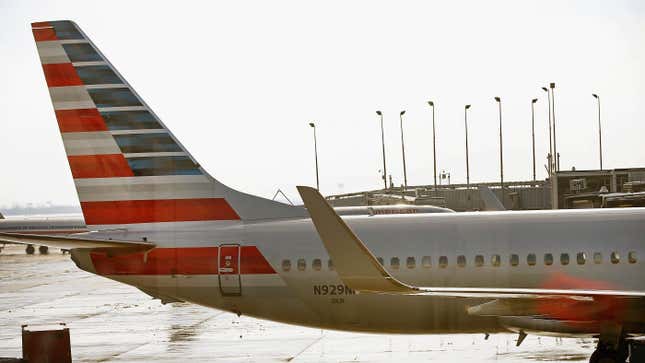
In This Story
American Airlines could soon have a strike on its hands.
The Association for Professional Flight Attendants, APFA, the union that represents most American Airlines flight attendants, recently set up a Strike Command Center in anticipation of a mass work stoppage. Negotiations that would prevent a strike are ongoing.
Here is a breakdown of what is happening.
What is being negotiated?
American Airlines and APFA are currently negotiating a collective bargaining agreement — a document that details expectations around pay, benefits, and work practices. In its most recent annual report, American Airlines noted that 87% of its 129,700 full-time workers are unionized. Of that number, 23,200 are organized under the APFA.
How long has it been since the last contract expired?
The last contract expired in 2019 and has not been renewed since. It was temporarily extended in March 2020 through June 2021 but did not cover raises, meaning there have been no pay increases since 2019. It is possible for the company to establish raises at any time, but it has chosen not to do so.
Why have these negotiations lasted so long?
In part, the APFA’s negotiations with American Airlines were stalled out by the COVID-19 pandemic. That is why the original agreement was extended. But the APFA is also in a unique situation. Most unions look to the National Labor Relations Act to govern their activity, but airline and railway industries are governed by the Railway Labor Act.
Because RLA industries can have heightened impact on interstate commerce, they are not as free to strike and do other forms of economic protest. Before they can strike, they have to sit with government mediators who are tasked with keeping talks going and preventing an impasse.
What are the sticking points?
The biggest sticking point is pay. American Airlines recently offered flight attendants 17% raises effective immediately, but the APFA rejected that offer because they are seeking 33% raises, Reuters reports.
“The APFA Board of Directors unanimously rejects management’s proposal and encourages, in the strongest way possible, the company to put all of its attention towards reaching an agreement with our Union and avoiding a crippling strike,” the union said in a statement at the time.
The APFA is also seeking retroactive pay, which would be money paid now for raises that were missed out on during negotiations — in the last year of the contract, flight attendants entering their 13th year of service would have been entitled to a 15.8% pay bump — and to retain more control over how its members are scheduled.
American Airlines did not return a request for comment.
What happens if an agreement isn’t reached?
Representatives from the APFA and American Airlines are currently in Washington, D.C. for another mediation session. If talks continue to prove unfruitful, the government might grant a request for the APFA to be “released” from negotiations. In that event, American and the flight attendants would be subjected to a 30-day “cooling-off” period that would also begin a period of “super mediation” — intense, round-the-clock negotiations.
If an agreement still doesn’t result, the APFA will then be allowed to strike. In August, the union called a strike vote where members were nearly unanimous in their support for a mass work stoppage.
Michael Linenberg, an analyst at Deutsche Bank who covers the airline industry, says government mediators will do everything they can to avoid that outcome because a summertime strike would upend American’s vacation plans.
“The optics aren’t good, and I think they appreciate that,” he said.